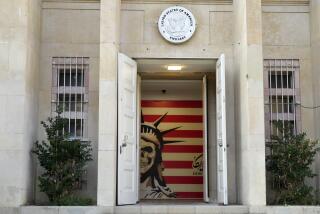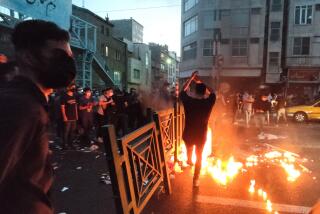Khatami in a TV Spotlight
Iran’s President Mohammad Khatami has agreed to be interviewed by Cable News Networkthis week, giving him the chance to open what he has termed a “thoughtful dialogue” with “the great people and nation of America.” U.S. policymakers and others who watch and weighdevelopments in Iran are eager to see how Khatami might give substance to that idea, first proposed in a speech to an Islamic conference on Dec. 14. With the same care once give to pronouncements by Soviet leaders during the iciest days of the Cold War, analysts will scrutinize the interview for hints of where Iranian policy might be trending.
Whether the cold war that has prevailed in U.S.-Iran relations since 1979 could be nearing an end is the question of the moment. Khatami was elected president last May by a remarkable70% of Iranian voters. He was the candidate of change, at least to the extent that differnces with the rigid social and political policies of the clerical regime could be openly expressed. His election underscored a deep weariness among Iranians with the joylessly restrictive rules they have been forced to live under since the triumph of the Islamic revolution.
Observations by visitors to Iran also suggest that little public enthusiasm remains for the hate-America campaign that has been an enduring feature of that revolution. Khatami is a populist president. But to effect change he must also be a powerful president. And here a big question mark looms.
Ultimate power in Iran formally rsts with Ayatollah Ali Kamenei, the hard-line supreme spiritual leader who, if he favored change, could have long since brought it about. In a sermon on Friday, Khamenei dismissed as malicious propaganda the notion that Iran was ready to seek a reconciliation “with the West and America.” Some analysts think Khamenei and the ruling clerics are merely waiting for Khatami to overreach himself before acting to curb his independent tendencies. Others think the tide is running Khatami’s way. The pending interview could show how secure Khatami feels. It could also, just maybe, be the curtain-raiser on a new act in U.S.-Iran relations.
However, even if Khatami should signal a readiness to move on, caution is in order. More normal relations could benefit both countries, but the major differences now dividing them are not going to be easily resolved. For one thing, Tehran, coolly assessing its national interests, is not likely to forswear seeking weapons of mass destruction simply to get on a cozier footing with Washington. Neither should it be expected that Iran will rush to drop its agggressive opposition to the Arab-Israel peace process or admit its history of sponsoring acts of international terrorism, all conditions demanded by Washington.
The United States should follow up on any offer or hint of friendlier ties, but it should keep its expectations in check,and --recalling the humiliating failure suffered by the Reagan administration when it sought to exploit perceived “moderate” tendencies with Iran’s ruling circles--it should remember how little the outside world really knows about the mysteries, intrigues and pitfalls of Iranian politics.
More to Read
Sign up for Essential California
The most important California stories and recommendations in your inbox every morning.
You may occasionally receive promotional content from the Los Angeles Times.









